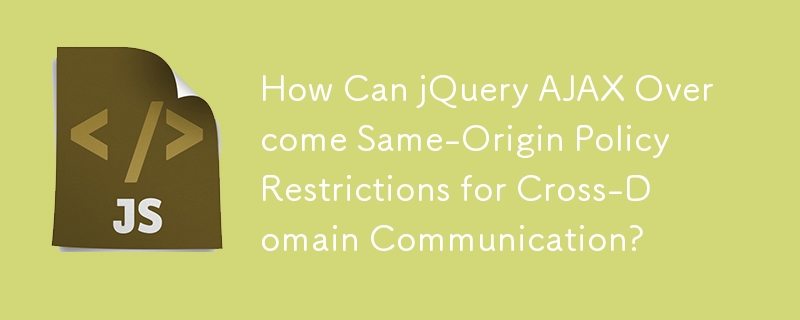

jQuery AJAX Cross-Domain Communication
Cross-domain AJAX requests encounter limitations due to Same-Origin Policy restrictions. When a client script on one domain attempts to access resources from a different domain, it typically fails due to security concerns.
Case:
Consider the case where test.php resides on a localhost, while testserver.php is hosted on a web server. An AJAX request from test.php to testserver.php will fail, triggering an "Error" alert due to the cross-domain nature of the request.
Solution:
To overcome this limitation, JSONP (JSON with Padding) can be employed.
jQuery:
$.ajax({
url: "testserver.php",
dataType: "jsonp", // Note the lowercase 'p' in JSONP
success: function (json) {
// Handle successful response
alert("Success");
},
error: function () {
alert("Error");
}
});PHP:
<?php
$arr = array("element1", "element2", array("element31", "element32"));
$arr['name'] = "response";
echo $_GET['callback'] . "(" . json_encode($arr) . ");";
?>In PHP, the callback function name passed by jQuery is available via $_GET['callback']. By echoing a response in the format "callbackName('jsonString')", we allow jQuery to interpret the JSON data.
Alternative:
jQuery provides a shorthand method called $.getJSON() which simplifies cross-domain AJAX requests. However, it requires appending "callback=?" to the URL as a GET parameter. jQuery automatically replaces this placeholder with its generated callback method.
The above is the detailed content of How Can jQuery AJAX Overcome Same-Origin Policy Restrictions for Cross-Domain Communication?. For more information, please follow other related articles on the PHP Chinese website!
 Windows driver wizard function
Windows driver wizard function
 What should I do if my computer won't turn on?
What should I do if my computer won't turn on?
 The difference between array pointer and pointer array
The difference between array pointer and pointer array
 What to do if the chm file cannot be opened
What to do if the chm file cannot be opened
 Implementation method of vue online chat function
Implementation method of vue online chat function
 What is the space code in html
What is the space code in html
 How to configure Tomcat environment variables
How to configure Tomcat environment variables
 Hide taskbar icon software
Hide taskbar icon software




